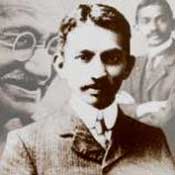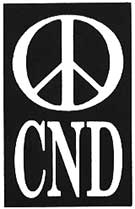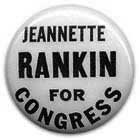 | Mohandas Gandhi launched his campaign of non-cooperation with Imperial British control of India. He called his overall method of nonviolent action Satyagraha, formed from satya (truth) and agraha, used to describe an effort or endeavor. This translates roughly as "Truth-force." A fuller rendering, though, would be "the force that is generated through adherence to Truth." |
Gandhi, 1919 | | |
 | The Campaign for Nuclear Disarmament (CND) was founded in London by philosopher Sir Bertrand Russell, then 86 years old, and the Rev. Canon (Lewis) John Collins of St. Paul's Cathedral. The peace symbol was originally developed for CND. | | | | |
| The Nevada-Semipalatinsk Movement to Stop All Nuclear Testing was founded in the USSR (Union of Soviet Socialist Republics). Olzhas Suleimenov, a popular Kazakh poet, was chosen to lead this first anti-nuclear non-governmental organization in Kazakhstan, formerly part of the USSR. Nevada-Semipalatinsk ended nuclear arms tests at the Semipalatinsk Polygon. Organizers had been inspired by the large Nevada Test Site anti-nuclear demonstrations and encampments outside Las Vegas in the mid-to-late 1980s. |  | |  | | a Semipalatinsk test > | | < demo at Semipalatinsk, 1990 | | |
U.S. District Judge Miles W. Lord held the officers of A.H. Robins Company personally liable for the injuries caused by the intrauterine contraceptive device they had produced and sold, the Dalkon Shield. Eighteen women had died, and more than 300,000 ultimately claimed injury.
| | | | Miles W. Lord | | The top three executives had to pay $4.6 million personally, and the company paid out $220 million in compensatory and $13 million in punitive damages to thousands of women. Judge Lord: "The whole cost-benefit analysis is warped. They say, well you can kill so many people if the benefits are great enough . . . Once they put a price on human life, all is lost. Life is sacred. Life is priceless."
He also criticized Robins's legal strategy of requiring witnesses to discuss their sex lives: "You exposed these women, and ruined families and reputations and careers, in order to intimidate those who would raise their voices against you," he said. "You introduced issues that had no relationship whatsoever to the fact that you implanted in the bodies of these women instruments of death, mutilation and of disease."
Judge Lord was called before a review panel for his professional and judicial conduct in the case but the charges were dismissed and he continued to serve until retirement. | |
|
| The National Advisory Commission on Civil Disorders (Kerner Commission) warned that racism was causing America to move "toward two societies, one black, one white – separate and unequal." Former Illinois Gov. Otto Kerner and his commission were charged by Pres. Lyndon Johnson to look into the causes of the many riots that had taken place in recent years. | | |
|

| Nuclear Free and Independent Pacific Day, or Bikini Day, marks the anniversary of the explosion of the largest-ever U.S. nuclear weapon which contaminated major parts of the Marshall Islands [see February 28, 1954]. The land and people of the south Pacific have been exposed to numerous nuclear bomb tests and their radioactive aftermath.
In addition to the 67 atmospheric U.S. tests at Bikini and Eniwetok Atolls, France tested 193 weapons in French Polynesia, 46 in theatmosphere. The U.K. exploded 34 devices on Malden and Christmas Islands. | | The day is also intended to call attention to the potential danger of the increasing trans-oceanic shipment of hazardous nuclear materials, and the need of nuclear and shipping nations to consider the rights and health of the indigenous peoples of the region. | |
| The University of Alabama permanently expelled Autherine Lucy, the first African-American person ever admitted to the University (following a federal court's ordering her admission). | | She was met with rioting by thousands of students and others (none of whom were either disciplined or arrested). She charged in court that University officials had been complicit in allowing the disorder, as a means of avoiding compliance with the court order. The trustees expelled her for making such "baseless, outrageous and unfounded charges of misconduct on the part of the university officials." |  | |
Burning desegregation litgerature at the University of Alabama. Students, adults and even groups from outside of Alabama shouted racial epithets, threw eggs, sticks and rocks, and generally attempted to block her way.
|  |
Autherine Lucy Foster receives her master's degree from University of Alabama in 1992.
| |
|
| 
| President John F. Kennedy issued Executive Order 10924 establishing the Peace Corps as a new agency within the Department of State. The same day, he sent a message to Congress asking for permanent funding for the agency, which would send trained American men and women to foreign nations to assist in development efforts. The Peace Corps captured the imagination of the U.S. public, and during the week following its creation, thousands of letters poured into Washington from young Americans hoping to volunteer. | | |
| 
| The U.S. Congress sought to end international slave trade by passing an act to make it unlawful "to import or bring into the United States or the territories thereof from any foreign kingdom, place, or country, any negro, mulatto, or person of colour, with intent to hold, sell, or dispose of such negro, mulatto, or person of colour, as a slave, or to be held to service or labour." Domestic traffic in slaves, however, was still legal and unregulated.
The first shipload of African captives to North America had arrived at Jamestown, Virginia, in August 1619, and the first American slave ship, named Desire, sailed from Marblehead, Massachusetts, in 1637. In total, nearly 15 million Africans were transported as slaves to the Americas. The African continent, meanwhile, lost approximately 50 million human beings to slavery and related deaths. Despite the federal prohibition and because the slave trade was so profitable, an additional 250,000 slaves would be "imported" illegally by the time the Civil War began in 1861. | |
| Nine months before Rosa Parks made headlines, teenager Claudette Colvin was arrested in Montgomery, Alabama, for refusing to give up her bus seat to a white person. She was active in the Youth Council of the local NAACP (National Association for the Advancement of Colored People). Though the Montgomery Bus Boycott was begun after Ms. Parks's arrest, Clovin's legal case became part of the basis for a federal court challenge to Alabama's segregation laws. Colvin became one of four plaintiffs in Browder v. Gayle, in which the Supreme Court ultimately struck down the law under which she was arrested for merely sitting down in a bus seat. |  Claudette Colvin later in life Claudette Colvin later in life | | |
| In the midst of the Civil War, Pres. Abraham Lincoln signed a conscription act that created the first draft lottery of American citizens. The act called for registration of all males between the ages of 20 and 35, and unmarried men up to 45, including aliens with the intention of becoming citizens, by April 1. Exemptions from the draft could be bought for $300 or by finding a substitute draftee. Many objected to this provision describing the war as a "rich man's war, but poor man's fight." Black Americans were also not eligible for the draft because they weren't considered citizens. | 
| | Bounties for New York military "volunteers" during the Civil War | |
|
| The day before Woodrow Wilson's inauguration as president, 8000 from the National American Woman Suffrage Association (NAWSA), representing every state, marched in Washington, D.C. to call for a constitutional amendment granting women the right to vote. |  | Organized by Alice Paul and Lucy Burns, who had been inspired by the parades, pickets and speeches of the British suffragists, the march drew hundreds of thousands of spectators. Though some of the marchers were attacked by onlookers, the march focused attention on the suffrage issue.
[see March 4, 1917 below] | | | | |
| In the first-ever worldwide theatrical act of dissent, there were at least 1029 stagings of Lysistrata, the 2400-year-old anti-war comedy by Greek playwright Aristophanes. Conceived and organized in just two months by Kathryn Blume and Sharron Bower, the performances all occurred on the same day to express opposition to the U.S. invasion of Iraq. |
 | Staged in 59 countries (including Iraq), the bawdy play tells of Athenian and Spartan women who unite to deny their lovers sex in order to stop the 22-year-long Peloponnesian War between the two city-states. Desperate for intimacy, the men finally agree to lay down their swords and see their way to achieving peace through diplomacy. | About the organizer, Kathryn Blume >
|  | | | | Kathryn Blume | | Sharron Bower | | | | |
| 
| Montana elected Republican Jeanette Rankin as the first woman to sit in the U.S. House of Representatives three years before American women nationwide could legally vote. A persistent advocate for women's rights, particularly suffrage, Rankin voted in Congress against American entry into both world wars, and late in life led marches against the Vietnam war. |

| | Rep. Jeannette Rankin with her colleagues in the 61st Congress. | |
|
| Franklin Delano Roosevelt was sworn in as president in the midst of the Great Depression. From his inaugural address: | "This is preeminently the time to speak the truth, the whole truth, frankly and boldly. Nor need we shrink from honestly facing conditions in our country today. This great Nation will endure, as it has endured, will revive and will prosper.
So, first of all, let me assert my firm belief that the only thing we have to fear is fear itself -- nameless, unreasoning, unjustified terror which paralyzes needed efforts to convert retreat into advance. In every dark hour of our national life, a leadership of frankness and of vigor has met with that understanding and support of the people themselves which is essential to victory." | |
Pres. Franklin Delano Roosevelt delivering his first inaugural address | |
| Moved to action by Pres. Lyndon Johnson's sustained bombing of North Vietnam beginning two months before, Vietnam Day was declared by the Universities Committee, led by Wayne State University Prof. Otto Feinstein. At about 100 college campuses nationwide, faculty, students and others gathered for lectures and meetings about the war. This occurred just three weeks before the first "teach-in" at the University of Michigan. | | |
| 
| The Union of Concerned Scientists (UCS) was founded. From its founding document: "Misuse of scientific and technical knowledge presents a major threat to the existence of mankind. Through its actions in Vietnam our government has shaken our confidence in its ability to make wise and humane decisions. There is also disquieting evidence of an intention to enlarge further our immense destructive capability..." | | |
The Nuclear Non-Proliferation Treaty went into effect after ratification
by 43 nations. | | The agreement sought to prevent the spread of nuclear weapons and weapons technology, to promote cooperation in the peaceful uses of nuclear energy, and to further the goal of achieving nuclear disarmament, as well as general and complete disarmament. It has since been joined by 189 countries, and is enforced through the United Nations International Atomic Energy Agency. |
 | | |
| 
| Ukraine, having voluntarily agreed to give up its nuclear weapons following the collapse of the Soviet Union, began their transfer to Russia. Ukraine, which had the world's third largest weapons stockpile, 130 SS-19 missiles, 46 SS-24 missiles and dozens of strategic bombers, rid itself of all 1300 warheads within about two years. Schoolchildren preparing to turn the keys to destroy the last missile silo in the Ukraine. October 30, 2001 | | |
| The U.S. Supreme Court handed down the Dred Scott decision (Dred Scott v. Sandford) which declared that an escaped slave, Scott, could not sue for his freedom in federal court because he was not a citizen. Those of African descent could never be considered citizens but "as a subordinate and inferior class of beings," according to the Court. | | 
| Chief Justice Roger Taney stated in his opinion that the "unhappy Black Race . . . had no rights which the white man was bound to respect; and that the negro might justly and lawfully be reduced to slavery for his benefit. He was bought and sold and treated as an ordinary article of merchandise and traffic, whenever profit could be made by it."
| 
| | Dred Scott | Chief Justice Roger Taney | | |
 | Susan B. Anthony and more than 100 delegates from the National Woman Suffrage Association met with Pres. Chester Alan Arthur concerning women's right to vote. Anthony asked him, "Ought not women have full equality and political rights?" He responded, "We should probably differ on the details of that question." |  | | Susan B. Anthony | Pres. Chester Alan Arthur | | |
 | Ghana became the first black African country to become independent from colonial rule.
Dr. Kwame Nkrumah became independent Ghana's first leader. |

Ghana's flag
|
Dr. Kwame Nkrumah | |
| Muhammad Ali was ordered by the Selective Service to be inducted into military service. He refused, citing his religious beliefs that precluded him from killing others. |  "I ain't got no quarrel with those Vietcong." "I ain't got no quarrel with those Vietcong."
|  | < Top Black athletes gather to hear Muhammad Ali (formerly Cassius Clay) give his reasons for rejecting the draft, United States, June 4, 1967. | | |
 | The University for Peace near San Jose, Costa Rica, was founded. UPeace, the U.N.-mandated graduate school of peace and conflict studies had been chartered by the General Assembly for research and the dissemination of knowledge specifically aimed at training and education for peace. |
The monument on campus sculpted by Cuban artist Thelvia Marín in 1987,
is the world's largest peace monument. | 
| |










 Claudette Colvin later in life
Claudette Colvin later in life
















 "I ain't got no quarrel with those Vietcong."
"I ain't got no quarrel with those Vietcong." 


No comments:
Post a Comment